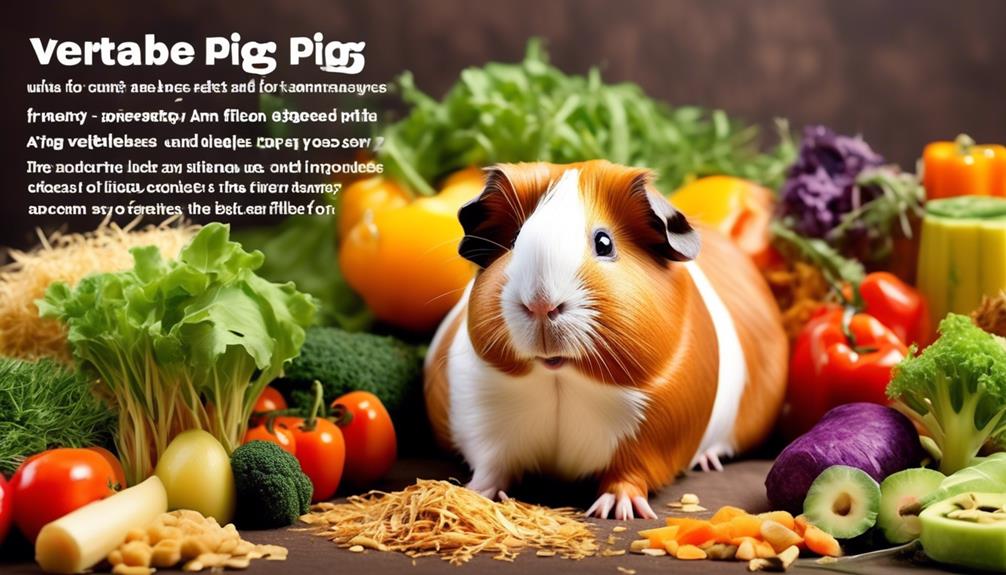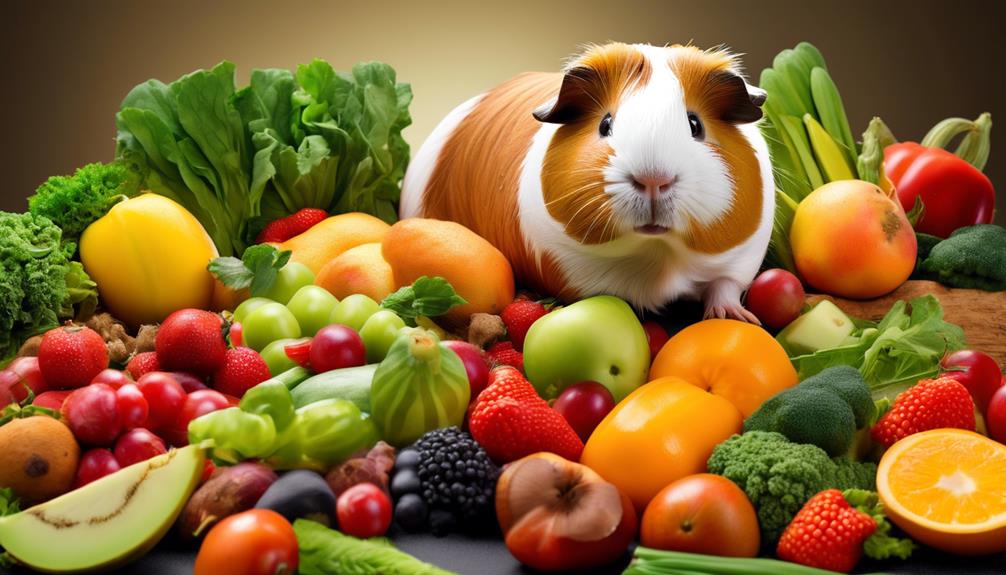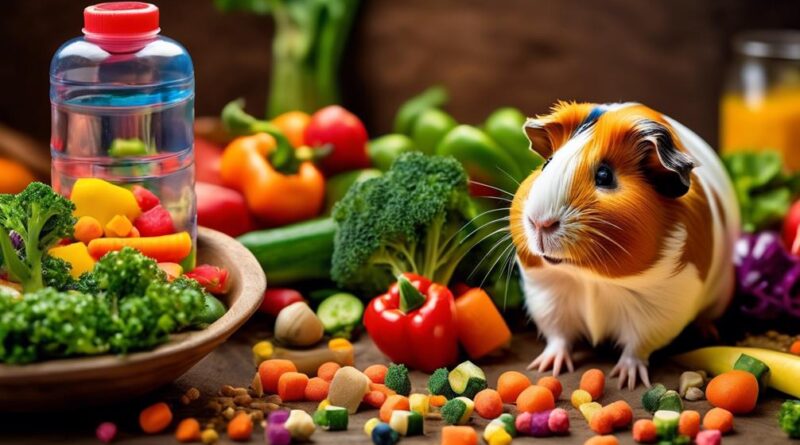What Are Essential Nutritional Requirements for Breeding Guinea Pigs?
Are you providing your breeding guinea pigs with the essential nutritional requirements they need for optimal health and reproduction? Understanding the specific dietary needs of breeding guinea pigs is crucial to ensuring the health and well-being of both the mother and her offspring.
From energy and protein requirements to the importance of vitamins, minerals, and fiber, there are key factors to consider when it comes to their diet. But what exactly are these essential nutritional requirements, and how do they impact the breeding process?
Let's explore the critical elements of a guinea pig's diet and how they play a vital role in successful breeding and healthy offspring.
Energy Requirements
To meet the energy requirements of breeding guinea pigs, provide a diet rich in high-quality hay and commercial guinea pig pellets. The metabolic rate of breeding guinea pigs is significantly higher than that of non-breeding adults. This means that they need a consistent source of energy to support their increased activity levels and the energy demands of pregnancy and lactation.
Carbohydrate sources play a crucial role in meeting these heightened energy needs. High-quality hay, such as Timothy hay, is an excellent source of long-lasting energy due to its high fiber content. Additionally, commercial guinea pig pellets formulated specifically for breeding guinea pigs can provide concentrated energy from carbohydrates.
It's essential to ensure that breeding guinea pigs have access to an adequate amount of hay at all times. The high fiber content in hay not only provides sustained energy but also promotes healthy digestion, which is crucial for maintaining their metabolic rate.
Alongside hay, offering a measured portion of commercial guinea pig pellets provides a concentrated source of energy-dense carbohydrates. These pellets are specially formulated to meet the nutritional needs of breeding guinea pigs, including their increased energy requirements.
Protein Needs
Breeding guinea pigs, with their heightened metabolic rate and increased energy requirements, also have specific protein needs essential for supporting pregnancy, lactation, and overall health. Digestible proteins are crucial for breeding guinea pigs as they provide the necessary building blocks for growth and development. During pregnancy and lactation, the demand for protein increases significantly to support the growth of the fetuses and the production of milk. As a breeder, it's important to ensure that your guinea pigs receive high-quality protein sources to meet these increased needs.
When considering protein sources for breeding guinea pigs, it's essential to provide a balanced diet that includes hay, fresh vegetables, and specially formulated guinea pig pellets. Timothy hay is an excellent source of digestible proteins and should make up the bulk of the guinea pig's diet. Additionally, fresh vegetables such as bell peppers, kale, and carrots can also contribute to their protein intake while providing essential vitamins and minerals.
When choosing guinea pig pellets, opt for high-quality, balanced options that contain a suitable amount of protein to support breeding guinea pigs' needs. These pellets should contain a minimum of 18% crude protein to adequately support their growth and development.
Vitamin Essentials
For breeding guinea pigs, ensuring adequate vitamin intake is essential for supporting their overall health and reproductive success. When it comes to digestive health, guinea pigs require vitamin C to prevent scurvy, a condition that can lead to digestive issues and a weakened immune system. Including ample amounts of vitamin C-rich foods such as bell peppers, kale, and parsley in your guinea pig's diet is crucial for maintaining their digestive health and overall well-being.
Vitamin C is also vital for supporting the immune system of breeding guinea pigs. A deficiency in this vitamin can compromise their immune function, making them more susceptible to illnesses, which can negatively impact their ability to reproduce and care for their young. To ensure optimal immune function, it's important to provide a balanced diet that includes a variety of fresh vegetables and fruits high in vitamin C, as guinea pigs are unable to produce this vitamin on their own.
In addition to vitamin C, vitamin A is essential for maintaining good digestive health in breeding guinea pigs. This vitamin supports the health of the guinea pig's gastrointestinal tract and plays a key role in the functioning of their immune system. Including vitamin A-rich foods such as carrots, sweet potatoes, and dark leafy greens in their diet can help promote digestive health and overall immune function, contributing to successful breeding and the well-being of both the parent guinea pigs and their offspring.
Mineral Necessities
Ensuring that breeding guinea pigs receive adequate mineral intake is crucial for their overall health and reproductive success. As a responsible guinea pig owner, it's essential to understand the mineral necessities for these small mammals.
Here are some key points to consider:
- Calcium balance: Maintaining the right balance of calcium is vital for breeding guinea pigs. Adequate calcium levels are necessary for bone development in both the mother and the offspring. However, excessive calcium can lead to urinary issues and the formation of bladder stones. On the other hand, insufficient calcium can result in weak bones and complications during pregnancy and birth. Therefore, it's crucial to provide a balanced diet that meets their calcium requirements.
- Phosphorus levels: Phosphorus plays a crucial role in the guinea pig's overall health, particularly in bone formation, energy metabolism, and nutrient utilization. It's important to ensure that the phosphorus levels in their diet are appropriate. An imbalance of phosphorus can lead to skeletal issues and other health complications. Therefore, a well-balanced diet that includes the right amount of phosphorus is essential for breeding guinea pigs' reproductive success.
Understanding and addressing these mineral necessities will contribute to the overall health and well-being of your breeding guinea pigs. By providing a balanced diet and ensuring the right levels of calcium and phosphorus, you can support their reproductive success and help them lead healthy, happy lives.
Fiber Importance

Maintaining a well-balanced diet that meets the fiber requirements is crucial for the overall health and reproductive success of your breeding guinea pigs. Fiber plays a vital role in their digestive health, ensuring their gastrointestinal system functions optimally. Adequate fiber intake helps prevent issues such as diarrhea, constipation, and gastrointestinal stasis, which can be detrimental to the health and wellbeing of your guinea pigs, especially during the breeding period.
Incorporating dietary diversity is key to meeting your guinea pigs' fiber needs. Offering a variety of high-fiber foods such as timothy hay, grass hay, and fresh vegetables like kale, parsley, and carrots can help ensure they receive the essential fiber for their diet. These fibrous foods aid in maintaining healthy gut motility and provide the necessary bulk for proper digestion, supporting the overall digestive health of your breeding guinea pigs.
Moreover, fiber plays a crucial role in regulating blood sugar levels and preventing obesity in guinea pigs. By providing a diet rich in fiber, you can help manage their weight, which is particularly important for breeding guinea pigs, as obesity can lead to reproductive issues and complications during pregnancy.
Water Intake
To ensure optimal health and reproductive success for your breeding guinea pigs, it's essential to monitor their water intake closely. Adequate hydration is crucial for the overall well-being of guinea pigs, especially during the breeding period. Here are some important points to consider regarding water intake for your breeding guinea pigs:
- Hydration Balance: Maintaining a proper hydration balance is critical for breeding guinea pigs. Dehydration can lead to serious health issues and can negatively impact their reproductive capabilities. Ensure that clean, fresh water is available at all times, as breeding guinea pigs may require more water than usual, especially during gestation and lactation.
- Drinking Behavior: Pay close attention to the drinking behavior of your breeding guinea pigs. Monitor how much water they consume on a daily basis. Any significant changes in their drinking behavior could be an indication of an underlying health issue. Consult with a veterinarian if you notice any unusual patterns in their water consumption.
- Water Quality: The quality of the water provided to breeding guinea pigs is as important as the quantity. Ensure that the water is clean and free from contaminants. Regularly clean and refill their water bottles or bowls to prevent bacterial growth and contamination.
- Environmental Factors: Environmental conditions can also impact the water intake of breeding guinea pigs. Ensure that they aren't exposed to extreme temperatures that could lead to excessive water loss through evaporation or increased water intake due to overheating.
Nutritional Supplements

Monitoring your breeding guinea pigs' water intake closely is essential for their overall health; now let's explore the importance of nutritional supplements in their diet.
Ensuring that your guinea pigs receive a balanced diet is crucial for their wellbeing. While a high-quality guinea pig pellet provides essential nutrients, offering additional supplements can further support their nutritional balance.
Nutritional supplements can play a vital role in maintaining your breeding guinea pigs' digestive health. Vitamin C is an essential supplement for guinea pigs as they can't produce it on their own. Including vitamin C-rich foods or supplements in their diet can prevent scurvy and support their immune system. Another crucial supplement is hay, which aids in maintaining proper digestion and dental health. Offering a variety of hays such as timothy, orchard grass, or oat hay can help ensure a well-rounded diet for your guinea pigs.
In addition to vitamin C and hay, you may consider providing your breeding guinea pigs with small amounts of fresh vegetables to supplement their diet. Vegetables like bell peppers, kale, and parsley can contribute to their overall nutritional balance and digestive well-being. However, it's important to introduce new foods gradually and monitor their digestive response.
Pregnancy and Lactation Diet
During pregnancy and lactation, your breeding guinea pigs require a diet rich in essential nutrients to support their increased metabolic needs and the health of their offspring. It's essential to ensure that they receive the necessary nutrition to thrive during this critical time.
Here are some key points to keep in mind for their pregnancy and lactation diet:
- Nutrient-Rich Foods: Providing a balanced diet that includes fresh hay, high-quality guinea pig pellets, and a variety of fresh vegetables is crucial. These foods will supply essential vitamins and minerals, such as vitamin C, calcium, and folate, which are vital for the health of both the mother and her babies.
- Dietary Restrictions: While it's important to offer a diverse range of foods, there are certain dietary restrictions to consider. For example, during pregnancy, it's best to limit fruits and high-sugar vegetables to prevent excessive weight gain. Additionally, foods that are high in calcium, such as spinach and kale, should be given in moderation to avoid potential complications during labor.
- Hydration: Ensuring that your breeding guinea pigs have access to fresh, clean water at all times is essential, especially during pregnancy and lactation. Proper hydration supports the production of milk and helps prevent issues such as dehydration and urinary problems.
- Monitoring and Adjusting: Keep a close eye on your pregnant and lactating guinea pigs' food intake and weight. If you notice any changes in appetite or behavior, it may be necessary to adjust their diet or seek advice from a veterinarian to ensure they and their offspring remain healthy throughout this crucial stage.
Frequently Asked Questions
Can Breeding Guinea Pigs Eat the Same Diet as Non-Breeding Guinea Pigs?
Yes, breeding guinea pigs have different nutritional needs than non-breeding guinea pigs. Their breeding diet should include higher levels of certain nutrients like protein and calcium.
It's important to adjust their feeding schedule and dietary restrictions to meet these specific requirements. Providing the right nutrition is crucial for the health of breeding guinea pigs and their offspring.
Always consult with a veterinarian for guidance on the best diet for breeding guinea pigs.
How Much Weight Should a Pregnant Guinea Pig Gain During Pregnancy?
During pregnancy, it's important for your guinea pig to gain weight gradually to support the growing babies. Ensure a nutritional balance with increased levels of vitamin C, protein, and calcium. Offer plenty of fresh hay, pellets, and veggies to meet her needs.
Monitor her weight gain and consult a vet for any concerns. Regular check-ups will help ensure a healthy pregnancy and delivery.
Are There Any Specific Foods That Should Be Avoided During Pregnancy and Lactation?
During pregnancy, it's crucial to avoid certain foods that can harm your guinea pig's health. These include high-sugar treats, processed foods, and foods high in fat. Stick to a balanced pregnancy diet with plenty of hay, fresh veggies, and vitamin C-rich foods.
Signs of malnutrition include weight loss, dull coat, and lethargy, so keep an eye on your guinea pig's weight gain and overall health.
What Are the Signs of Malnutrition in Breeding Guinea Pigs?
Signs of malnutrition in breeding guinea pigs include:
- Weight loss
- Rough or dull coat
- Reduced activity
- Dental issues
Symptoms may also include:
- Diarrhea
- Constipation
- Decrease in food and water intake
It's crucial to monitor their nutritional intake during breeding to ensure they're getting the essential nutrients they need. If you notice any of these signs, it's important to consult a veterinarian to address their dietary needs.
How Often Should Nutritional Supplements Be Given to Breeding Guinea Pigs?
You should maintain a proper nutritional balance for your breeding guinea pigs to ensure their health.
When necessary, dietary supplements can be given, but it's important to consult a veterinarian to determine the appropriate dosage and schedule.
Regularly monitor your guinea pigs' feeding schedule and adjust as needed to ensure they're receiving the essential nutrients for their breeding needs.
Conclusion
In conclusion, ensuring your breeding guinea pigs receive the essential nutritional requirements is crucial for their health and the health of their offspring.
Providing a balanced diet that meets their energy, protein, vitamin, mineral, and fiber needs, along with adequate water intake and potential supplementation, is key to supporting their breeding and lactation needs.
By prioritizing their nutrition, you can help ensure the successful reproduction and wellbeing of your guinea pigs.
